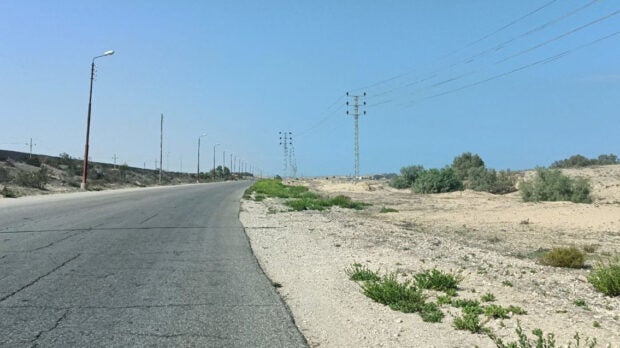20 Filipinos to exit Gaza Strip through Rafah border crossing on Sunday — DFA

FILE PHOTO: View of the Rafah border area from the Egyptian side, as aid groups await a decision for it to open, to enter the besieged Gaza Strip, amid the ongoing conflict between Israel and the Palestinian Islamist group Hamas, in Rafah, Egypt, October 16, 2023. REUTERS/Stringer
MANILA, Philippines — All Filipinos left in the war-torn Gaza Strip were granted permission to leave, with 20 of them to cross the Rafah border crossing to Egypt on Sunday, the Department of Foreign Affairs (DFA) told INQUIRER.net.
In a text message on Saturday, DFA Undersecretary Eduardo de Vega said they were informed Friday night that the Filipinos will be allowed to leave in batches.
“There is approval for all 134 left but they will be allowed to leave in batches. We were informed last night,” he said.
De Vega said 20 Filipinos are already scheduled to go out Sunday, then it will be followed by around 30 more afterwards.
The succeeding batches are being finalized, he noted.
According to the Undersecretary, with their Palestinian relatives not allowed to exit the Gaza Strip, there is now less interest among Filipinos there to leave the place.
“Now, about 43 are ready to leave at moment’s notice,” he said.
“The 8 in Gaza City are still there,” he added.
Meanwhile, during the Saturday News Forum in Quezon City, De Vega recalled that there were 136 Filipinos in the Gaza Strip and two were already able to exit the place.
Among the 134 Filipinos left, De Vega said 115 initially signified that they want to go home, however, knowing that their Palestinian spouses and other relatives will not be able to accompany them in crossing the border, only at least 43 were left decided to leave Gaza.
De Vega also noted that children of Filipinos in Gaza were as well given permission to leave as they have Filipino passports.
“Yung kasing mga anak po ng mga Filipino mother, kahit half-Palestinian, naka-dual citizen, pero may Filipino passport, they are allowed to leave,” he said.
(The children of Filipino mothers, even half-Palestinians, are dual citizens. They have Filipino passports, they are allowed to leave.)
“Some of them are even apo, mga second generation, third generation na,” he added.
(Some are even grandchildren, on the second and third generations already.)